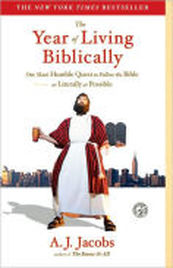 The Year of Living Biblically by A. J. Jacobs, original hardback published in 2007 by Simon & Schuster, now available in a number of formats and sources, all of which are listed on A. J. Jacobs’ website. You may also listen to Jacobs’ TED talk on the subject of his Biblical year and read an interview of Jacobs in Christianity Today.
The Year of Living Biblically by A. J. Jacobs, original hardback published in 2007 by Simon & Schuster, now available in a number of formats and sources, all of which are listed on A. J. Jacobs’ website. You may also listen to Jacobs’ TED talk on the subject of his Biblical year and read an interview of Jacobs in Christianity Today.
Well! If you look up all of the information I provide above you (almost) won’t need to read this post. But I hope you will, and then will go on and read the book. I had read it quite some time ago, probably around its publication, and had been struck with its essential sweetness, kindness and fairness.
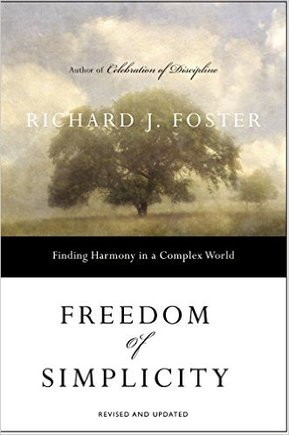
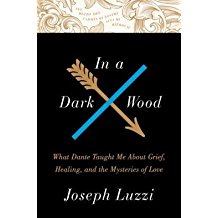 In a Dark Wood: What Dante Taught Me About Grief, Healing, and the Mysteries of Love by Joseph Luzzi, HarperCollins, 2015.
In a Dark Wood: What Dante Taught Me About Grief, Healing, and the Mysteries of Love by Joseph Luzzi, HarperCollins, 2015.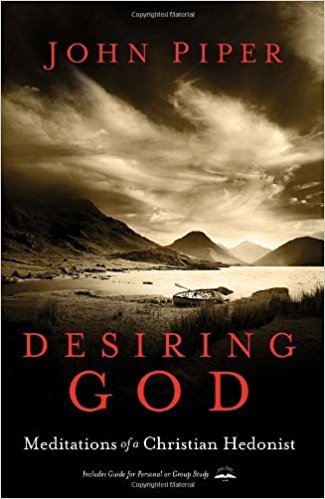 Desiring God: Meditations of a Christian Hedonist, rev. ed., by John Piper, Multnomah Press, 2011. Available in other formats and earlier editions.
Desiring God: Meditations of a Christian Hedonist, rev. ed., by John Piper, Multnomah Press, 2011. Available in other formats and earlier editions.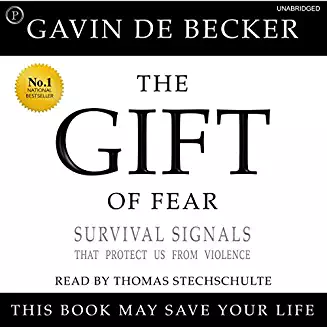 The Gift of Fear and Other Survival Signals that Protect Us from Violence by Gavin de Becker, Dell Trade Paperback, 1999, also available in other formats. I’m not sure why I was reminded of this book and put it on hold at the library. I had read it before and remembered portions of it quite well, but it was well worth re-reading. De Becker runs a security firm, providing services and counseling to people who feel and/or indeed are under threat. He himself grew up in an extremely violent home, but instead of becoming violent himself he decided to help reduce violence by giving people the tools they need to protect themselves.
The Gift of Fear and Other Survival Signals that Protect Us from Violence by Gavin de Becker, Dell Trade Paperback, 1999, also available in other formats. I’m not sure why I was reminded of this book and put it on hold at the library. I had read it before and remembered portions of it quite well, but it was well worth re-reading. De Becker runs a security firm, providing services and counseling to people who feel and/or indeed are under threat. He himself grew up in an extremely violent home, but instead of becoming violent himself he decided to help reduce violence by giving people the tools they need to protect themselves.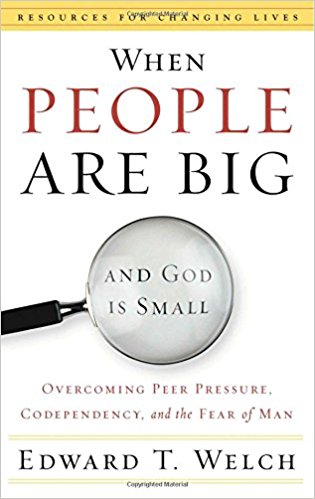 When People are Big and God Is Small: Overcoming Peer Pressure, Codependency, and the Fear of Man by Edward T. Welch, P & R Publishing, 1997. Published in cooperation with The Christian Counseling and Education Foundation.
When People are Big and God Is Small: Overcoming Peer Pressure, Codependency, and the Fear of Man by Edward T. Welch, P & R Publishing, 1997. Published in cooperation with The Christian Counseling and Education Foundation.
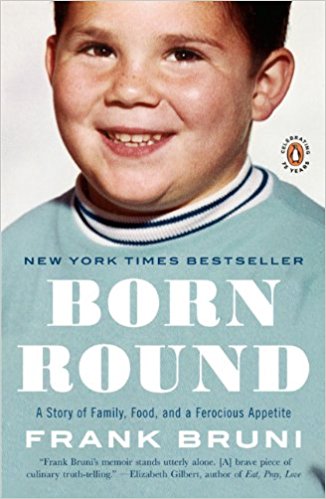 Just finished a fascinating book mostly about food and our relationship to it. Frank Bruni, who was the restaurant critic for the New York Times from 2004-2009, spent most of his life battling his weight. He grew up in an Italian-American family that put great emphasis on having mounds of food available at any and all times. If there wasn’t enough food on the table to make it sag, then there wasn’t enough. As Bruni moved into young adulthood he tried amphetamines, forced vomiting, and other extremely unhealthy measures to control his weight. After college he became a journalist, and at one point he was following George W. Bush on his campaign trail. He calculated that there were eight meals served daily to the press corps in an effort to keep them (literally) fat and happy so that they’d report positively on the candidate.
Just finished a fascinating book mostly about food and our relationship to it. Frank Bruni, who was the restaurant critic for the New York Times from 2004-2009, spent most of his life battling his weight. He grew up in an Italian-American family that put great emphasis on having mounds of food available at any and all times. If there wasn’t enough food on the table to make it sag, then there wasn’t enough. As Bruni moved into young adulthood he tried amphetamines, forced vomiting, and other extremely unhealthy measures to control his weight. After college he became a journalist, and at one point he was following George W. Bush on his campaign trail. He calculated that there were eight meals served daily to the press corps in an effort to keep them (literally) fat and happy so that they’d report positively on the candidate. Can reading, and re-reading, and re-re-reading a book make you happy? The answer is certainly yes for me. The book in today’s post didn’t just entertain me; it added a new facet to my understanding of the past, not only for the particular events described but for history in general. I don’t remember when I first read this, but it was probably when I was in high school. I came back to it as an adult and used its story about the ill-fated Richard III as the starting point for the 9th-grade world history class I taught for a number of years. I was reminded of the book recently because of all the hoo-hah around the discovery of Richard’s bones in Leicester, England, and their recent re-interment. Tey’s masterpiece has been dubbed the greatest detective novel of all time (Crime Writers’ Association, 1990), and I would agree with that assessment. You may recall an earlier post in which I said that Dorothy Sayers’ Gaudy Night was the greatest novel of the 20th century; that is only nominally a detective or mystery novel. So I’m not contradicting myself. Here’s my take:
Can reading, and re-reading, and re-re-reading a book make you happy? The answer is certainly yes for me. The book in today’s post didn’t just entertain me; it added a new facet to my understanding of the past, not only for the particular events described but for history in general. I don’t remember when I first read this, but it was probably when I was in high school. I came back to it as an adult and used its story about the ill-fated Richard III as the starting point for the 9th-grade world history class I taught for a number of years. I was reminded of the book recently because of all the hoo-hah around the discovery of Richard’s bones in Leicester, England, and their recent re-interment. Tey’s masterpiece has been dubbed the greatest detective novel of all time (Crime Writers’ Association, 1990), and I would agree with that assessment. You may recall an earlier post in which I said that Dorothy Sayers’ Gaudy Night was the greatest novel of the 20th century; that is only nominally a detective or mystery novel. So I’m not contradicting myself. Here’s my take: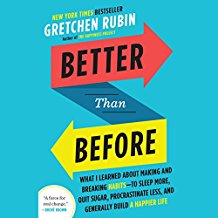 Better Than Before: Mastering the Habits of Our Everyday Lives by Gretchen Rubin, Crown Publishers, 2015.
Better Than Before: Mastering the Habits of Our Everyday Lives by Gretchen Rubin, Crown Publishers, 2015.